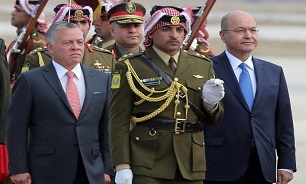Jordan King Visits Iraq for 1st Time in Decade
 King Abdullah's last visit to Iraq was in 2008, when he became the first Arab leader to go to Baghdad after dictator Saddam Hussein was toppled in 2003.
King Abdullah's last visit to Iraq was in 2008, when he became the first Arab leader to go to Baghdad after dictator Saddam Hussein was toppled in 2003.
It is the latest in a string of top-level visits to Iraq in recent weeks, which kicked off with a secret trip by US President Donald Trump. Saleh travelled to Jordan in November.
The two countries share a 179-kilometer border, and Jordan is a major importer of Iraqi crude oil.
In 2013, they agreed on a 1,700-kilometer pipeline linking Iraq's oil-rich Basra province to Jordan's Aqaba port, but the Daesh terror group’s sweep across nearly a third of Iraq put a screeching halt to the plan.
Last year, Jordan approved a framework to revive it, but did not give a timeframe for the line's construction.
The two states have also discussed plans for Iraq to import around 300 megawatts of electricity from Jordan to cope with widespread power shortages.
Currently, Baghdad relies heavily on its eastern neighbor Iran, importing around 1,300 megawatts of electricity and 28 million cubic meters of natural gas to feed power plants.
Washington, which sees Tehran as its top foe in the region, is keen to break those ties.
It reimposed tough sanctions on Iran in November but has granted Iraq a temporary waiver on energy imports, while urging it to partner with US firms instead.
Iraq has witnessed a revolving door of diplomatic visits since Trump went in late December.
US Secretary of State Mike Pompeo made a surprise stop in Baghdad on his regional tour last week, followed by Iran's oil minister then top diplomat Mohammad Javad Zarif, who landed Sunday.
French Foreign Minister Jean-Yves Le Drian also arrived Monday and met with Iraqi premier Adel Abdel-Mahdi.
Message end/
